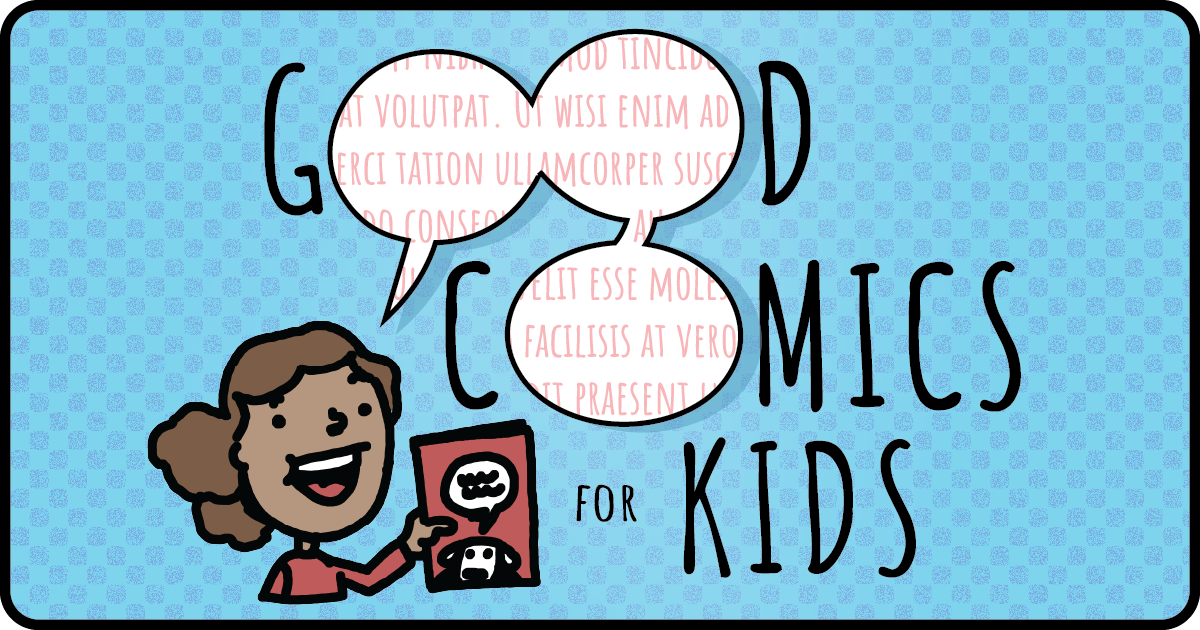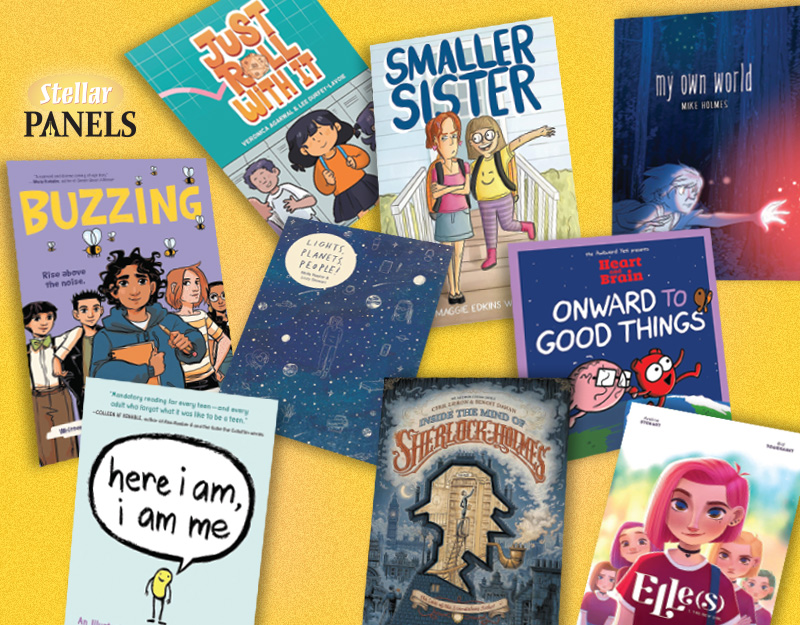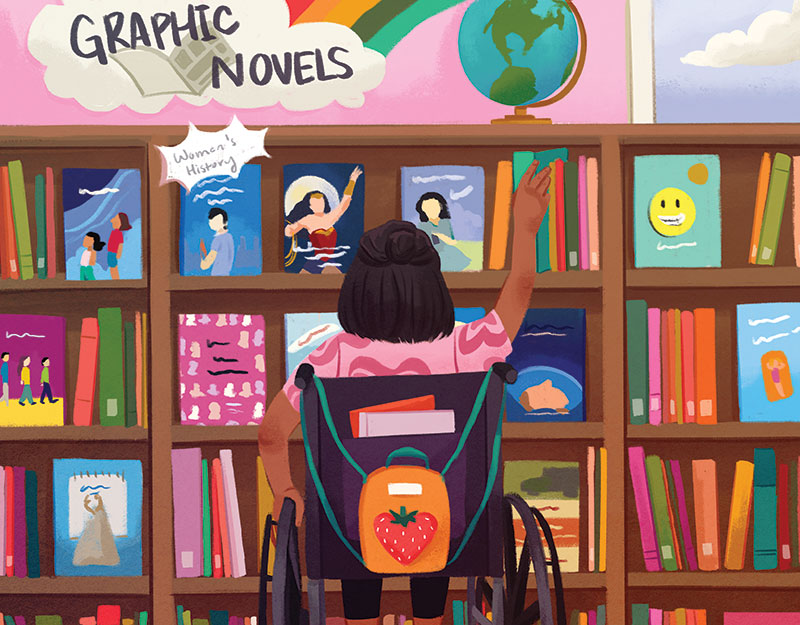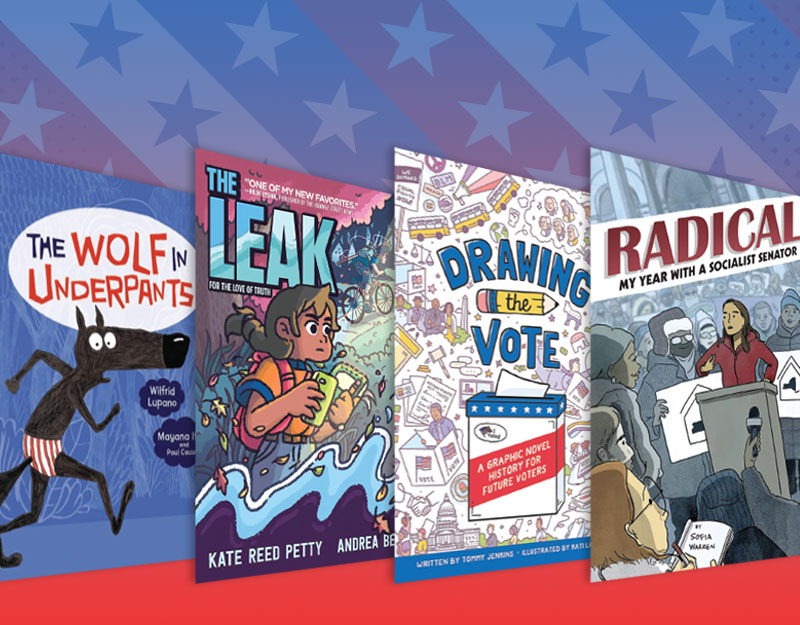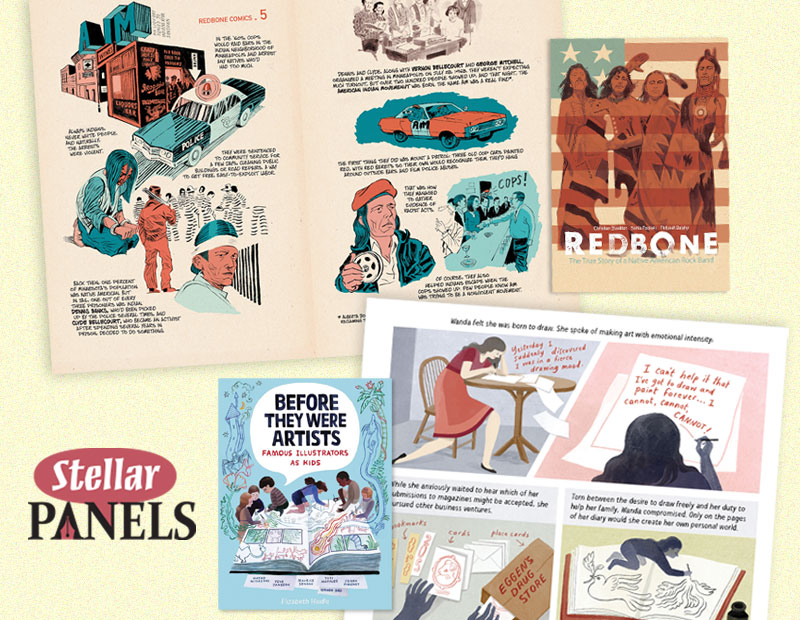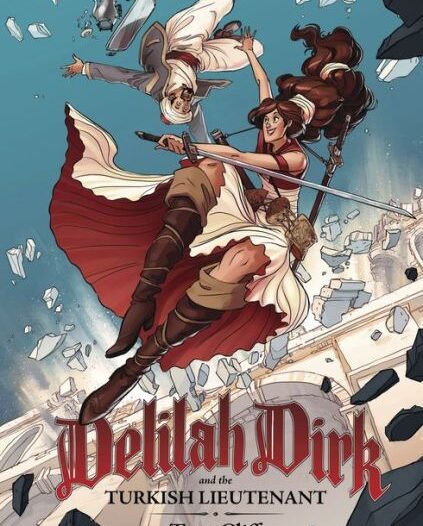
Interview: Tony Cliff and Delilah Dirk and The Turkish Lieutenant
She’s a fearless, reckless, globe-trotting, swashbuckling swordswoman, adventuress, and trouble magnet. He’s a fastidious functionary with a minor military job and a passion for blending, brewing, drinking, and sharing tea. Together they’re traveling companions.
That’s the relationship at the heart of cartoonist Tony Cliff’s new original graphic novel Delilah Dirk and The Turkish Lieutenant, in which the hurricane of a title character collides with the titular lieutenant Selim, and he finds himself swept up in her wake. Initially charged with interrogating her, when she escapes he’s then charged with failing to stop her and faced with the decision to either stay where he is and lose his head or follow the mysterious woman onto her flying boat.
ADVERTISEMENT
ADVERTISEMENT
Obviously, he chooses to follow Delilah. Otherwise, Cliff wouldn’t have material for an entire graphic novel, let alone a series of graphic novels (Almost immediately upon the release of the book, publisher First Second announced an in-the-works sequel).
We spoke with Cliff about his characters, where they came from, and where they might be going.
GC4K: Where did Delilah Dirk come from? One of the more fascinating aspects of the character is how familiar she seems, even upon first meeting her, perhaps in large part because she’s the synthesis of so many familiar influences, in terms of characters and genre adventures.
Tony Cliff: I’m glad she seems familiar! I always worry that she’s not accessible enough, because a lot of my motivation for making the character came from wanting to see something different. All the male heroes in the Napoleonic War fiction I was reading were pretty serious and, well, male. The women didn’t feature much at all, and the sword-swinging female heroes I read in late-90s Image comics were similarly serious and, honestly, dull.
I just wanted to see a character who was more fun, more light-hearted, and making that character a woman meant I got to play with a lot of the restrictive gender roles from the 19th-century setting I liked so much. Plenty of opportunity for conflict and jokes at the expense of how outdated those ideas would (hopefully) seem to a modern reader.
Mad Men gets a lot of mileage out of it; why can’t I?
GC4K: What about Selim; is he influenced by any particular people or characters or stories? In one way, he seems like he was created by picking a series of traits that are the opposite of those possessed by Delilah.
Cliff: The process was certainly not that intentional. I just did what felt natural, and that ended up giving me a more or less traditional character foil. A straight man for Delilah to play against. Someone against whom all Delilah’s action-y, adventurous, energetic pursuits would stand out in the greatest contrast. Someone who—among anybody—would be most impressed by Delilah’s stories of adventure, a taste for which they both share (consciously or otherwise).
At various points during the process I’ve stopped to write lists of character traits for Delilah and Selim, and have always felt a little embarrassed by the process. I know it’s probably part of a professional, disciplined writer’s habit to do such things—to clearly outline character attributes, to really get a good handle on how you think of your character—but it feels so reductionist. I like to let things play out as I go.
This is probably where a lot of difficulty comes during the rough draft stages. I’ll bet it would be easier to make choices if I had a stronger, more clearly outlined idea of each of the characters. That would probably reduce those instances of writer’s block. Oh well. They say you don’t know what you’re writing until you’ve got to the end of your project, so maybe I just have to embrace it.
GC4K: One interesting aspect of the story in this book is that while Delilah is the character with her name in the title, in big, bold, metallic font, and Selim’s only mentioned by occupation in much, much smaller font, this reads more like his story than hers. That is, when she first enters the narrative, her story is sort of told in a series of flashback panels appearing to illustrate Selim’s report, and her career as an adventuress seems well underway, and able to continue whether he’s with her or not. So why not Erdemoglu Selim and Delilah Dirk…?
Cliff: Well, I wanted to introduce the reader to Delilah Dirk, and I figured the best way to do that while simultaneously avoiding impersonal third-person narrative and giving the reader an avatar in the story who is appropriately astounded by Delilah’s outlandish exploits would be to see things through Selim’s eyes. It would put everything in the appropriate context.
Plus, as I kept working on the story, it just seemed that Selim’s story—wherein he effectively forces himself into an adventurous lifestyle for which he isn’t suited—was the most interesting aspect and the most worth exploring. It lets Delilah blaze her big, bold trail while Selim ducks and weaves from side to side.
GC4K: How fleshed out is Dirk’s backstory in your mind or notes? Do you know her whole amazing autobiography at this point, or do you find yourself “discovering” things about her as you continue to write and draw her?
Cliff: Specifically? No, I don’t know every last detail of her history. I know what’s pertinent, and I know about the important things that inform her character, but I haven’t dug a great worldbuilding well that I pull from as needed (for better or worse).
In terms of discovering new aspects, I think that’s a function of choices you make. I know generally how she’ll react in almost any situation. I think if I wanted to discover or reveal a new or different aspect of her character, that would be a thematically important element of the story. As such, I’d probably plan the hell out of it, taking away the spontaneous wonderment. I try to find my spontaneous writing joy from working on dialogue.
It’s tough, because you’ve got a goal you want to hit with the dialogue (in concert with the acting or action) and the trick is making it all feel natural and honest. That’s one of my pet peeves in books—when characters all just agree to talk toward the plot point.
GC4K: You have a background in animation, the comic has appeared in print, and appeared on the Internet as a webcomic, at least one piece of it has appeared in a print anthology, and it is now seeing print as a standalone graphic novel (albeit one with a sequel). How do you or did you ultimately envision this story? Is it a graphic novel series that was originally serialized on the web, or a web comic that’s been collected? Or are those distinctions not terribly important to you?
Cliff: My intention had always been that The Turkish Lieutenant would be a printed graphic novel, at least once I had started to put it together. The anthology story you mentioned—that story and another, The Treasure of Constantinople—were little stand-alone comics that I made more or less for fun. They seemed to have a certain appeal, so I thought I might combine them into what turned into The Turkish Lieutenant, and my intention was for that to be a printed book.
I think if I were to make a comic or graphic novel or whatever specifically for the web, I would want to take advantage of the web’s special traits, like hotlinking, animation, interactivity. Since I’d intended The Turkish Lieutenant for pairs of facing paper pages, the challenge was more in reproducing that reading experience online than anything else. So yes, the distinctions are important to me, but not so important that I didn’t want to take advantage of the opportunities that serializing the comic online would present.
GC4K: I asked about Delilah’s backstory because it seems so expansive and extensive, but what about her future? Do you have her and Selim’s futures pretty well planned out, or is their story fairly open-ended at this point? That is, do you envision a set number of books, or is this something you could see going on for ever? (And, related I suppose, is it something you can see yourself being happy writing and drawing forever?)
Cliff: To a certain degree, I think I’ve been approaching it the way C.S. Forester seems to have approached the volumes of his Hornblower series. They were all written and published in an order that does not correspond with the chronology of the stories. The first book finds Hornblower as a captain or something, then the fifth book relates the story of how he joined the navy, and maybe the third book takes place somewhere in-between.
I’m still very early along in the publication of a series of Delilah Dirk stories, to say the very least, but I hope that if I do publish a series out of sequence that readers will be understanding.
This is all by way of saying no, I do not have a specific number of stories in mind, the way Harry Potter unfolded. I do, however, have a few concepts I would definitely like to explore and a few locations I would like to visit, so I see a lot of potential. As long as I can keep the characters interesting and engaging, I’d like to keep making books. But we mustn’t get ahead of ourselves. One project at a time, one day at a time.
GC4K: While this is historical fiction rather than history (there’s a flying boat in the opening chapter, after all), did you find yourself doing very much in the way of historical research? One challenge of setting a story in a particular time and place in the real world is that it seems to require a convincing degree of familiarity on the part of the creator.
Cliff: Yes, establishing that familiarity is really difficult. There have often been periods when I’ve looked at the requirements of a scenario and been completely overwhelmed by the number of minute things I just don’t know about the setting, or the people, or the time. It’s hard to move forward, but the only solution is to just start making things up and hoping that the momentum of the story and the ripples of the characters’ drama will help those missing or incorrect details to sit quietly in the background. I research more-or-less constantly.
This is why the more recent work is a bit better… I’m always on the hunt for new visual resources, and I’ve spent quite a while trying to learn as much about the banal details of day-to-day life in 19th-century Turkey as I can.
Unfortunately the banal day-to-day details are not usually the sort of thing that captivates a historian. I see how it happens, though. This is hard to explain, but sometimes there are details that get absorbed through osmosis while poring through different resources, and it’s a surprise to you when you notice that they’re a thing that you’ve got in the knowledge banks. Tiny things like modes of addressing someone, or power relationships and organizational structures. A lot of resources don’t spell that sort of thing out, and it’s hard to specifically search for.
GC4K: Is this a will-they, won’t-they romance, or are they just friends, or is that something you mean to explore in the future? Selim obviously has strong feelings for Delilah, but in several places those feelings seem driven more by guilt or simply missing having her around than by anything much stronger.
I ask because as much as the details of the story recall old-school, late 19th, early 20th century adventure fiction and movies and comics, the interplay between the two feels a lot like that of a screwball comedy…only with more explosions and stabbings, of course.
Cliff: All I will say is that everything you need to know about their relationship is contained in the book. Anything you would like to infer from the evidence that’s presented on the page, you’re more than welcome to. How that corresponds to how the relationship unfolds, we’ll just have to wait and see as the pages turn.
GC4K: How passionate are you about tea?
Cliff: Certainly not as passionate as some people, that’s for sure. I like it, but my tastes are simple. Just give me a half-decent Earl Grey from a tea bag, plus milk and a bit of sugar. I think what I like more is the process and the accoutrements. The different infusers, and cups, and kettles and pots. The walls of different varieties at a good tea shop. It’s all very comforting and pleasing, but like I said, day-to-day just give me a no-fuss cup of black tea.
GC4K: And if you yourself had to choose, what would it be: Tea or swordplay?
Cliff: Oh, pff, when in doubt, I’ll always choose the more relaxing option.
Filed under: Interviews
About J. Caleb Mozzocco
J. Caleb Mozzocco is a way-too-busy freelance writer who has written about comics for online and print venues for a rather long time now. He currently contributes to Comic Book Resources' Robot 6 blog and ComicsAlliance, and maintains his own daily-ish blog at EveryDayIsLikeWednesday.blogspot.com. He lives in northeast Ohio, where he works as a circulation clerk at a public library by day.
ADVERTISEMENT
ADVERTISEMENT
SLJ Blog Network
Happy Poem in Your Pocket Day!
This Q&A is Going Exactly As Planned: A Talk with Tao Nyeu About Her Latest Book
Parsing Religion in Public Schools
Environmental Mystery for Middle Grade Readers, a guest post by Rae Chalmers
ADVERTISEMENT

